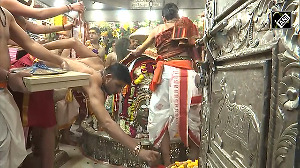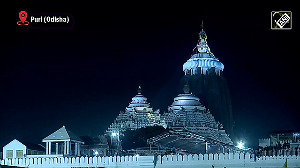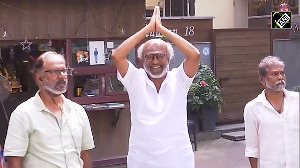Tibetan spiritual leader Dalai Lama was honoured with the prestigious Democracy Service Medal on Friday in Washington in recognition of his commitment to advancing the principles of democracy and human dignity.
Receiving the award at the Library of Congress on the Capitol Hill, the exiled Buddhist leader praised India's democracy.
Citing several examples of his interaction with Indian leaders, the Dalai Lama said, in India there is space for everyone to express their political views, which is very unlike China.
The award instituted by the National Endowment for Democracy was conferred on the Tibetan spiritual leader during his visit to the United States that has sparked a political row between Beijing and Washington.
In his acceptance speech, the Dalai Lama reiterated his personal commitment towards promotion of human values and democratic rights of the people world over.
"Change must come through people. Protection of individual human rights is very important for the development of the society," he observed.
Referring to democracy in India, the Tibetan leader said, "There was a big difference between Nehru and Acharya Kriplanai on the Tibetan issue."
The then prime minister Jawaharlal Nehru was against raising the Tibetan issue at United Nations, he said.
"I found big difference between Indian and Chinese parliament. In Chinese parliament there is too much silence and in Indian Parliament there is too much noise," he said.
The Dalai Lama said education is key to the success of democracy in any country. As such all the energy and resources of the Tibetan Government in exile is spend on education, he said.
Presenting the award, NED President Carl Gershman said, "The struggle of the Tibetan people to preserve their culture is world renowned. What is little known, however, is that the Dalai Lama, even before leaving Tibet, sought to implement significant reforms in the system of government."
"Only in exile was the Dalai Lama able to implement those reforms. Today, the Tibetan community in exile operates under a democratic constitution, with an elected National
Assembly and a Supreme Court, with day-to-day powers vested in an elected prime minister," he said.
"The Dalai Lama himself has often said that it is not enough to oppose Chinese totalitarianism, but that it is necessary to offer a democratic alternative," Gershman said.
Among those present on the occasion were Hollywood actor Richard Gere who is the chairman of the Washington-based International Campaign for Tibet.
President Barack Obama met the Tibetan spiritual leader ignoring strong Chinese objections and commended his "middle way approach" in resolving the vexed Tibetan issue.
After his meeting with Obama, the Dalai Lama said he wanted a "meaningful, sort of, autonomy so that we can preserve Tibetan unique culture and heritage, including our own language".
China has voiced strong protest over the meeting.







 © 2025 Rediff.com -
© 2025 Rediff.com -